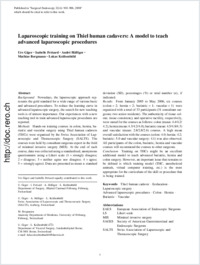Laparoscopic training on Thiel human cadavers: A model to teach advanced laparoscopic procedures
- Frésard, Isabelle Department of Surgery, Hôpital Cantonal Fribourg, Switzerland
- Häfliger, André Department of Surgery, Hôpital Cantonal Fribourg, Switzerland - Swiss Association of Laparoscopic and Thoracoscopic Surgery (SALTS), Aarberg, Switzerland
- Bergmann, Mathias Anatomy Department of Medicine, University of Fribourg, Switzerland
- Krähenbühl, Lukas Department of Surgery, Hôpital Cantonal Fribourg, Switzerland - Swiss Association of Laparoscopic and Thoracoscopic Surgery (SALTS), Aarberg, Switzerland - Department of Visceral Surgery, Lindenhofspital Berne, Switzerland
-
18.08.2007
Published in:
- Surgical Endoscopy. - 2008, vol. 22, no. 4, p. 901-906
Thiel human cadaver
education
laparoscopic surgery
advanced laparoscopic procedures
colon
hernia
bariatric
vascular
English
Background: Nowadays, the laparoscopic approach represents the gold standard for a wide range of various basic and advanced procedures. To reduce the learning curve in advanced laparoscopic surgery, the search for new teaching tools is of utmost importance. Our experiences with a new teaching tool to train advanced laparoscopic procedures are reported. Methods: Hands-on training courses in colon, hernia, bariatric and vascular surgery using Thiel human cadavers (THCs) were organised by the Swiss Association of Laparoscopic and Thoracoscopic Surgery (SALTS). The courses were held by consultant surgeons expert in the field of minimal invasive surgery (MIS). At the end of each course, data was collected using a standardised, anonymous questionnaire using a Likert scale (1 = strongly disagree; 2 = disagree; 3 = neither agree nor disagree; 4 = agree; 5 = strongly agree). Data are presented as mean ± standard deviation (SD), percentages (%) or total number (n), if indicated. Results: From January 2005 to May 2006, six courses (colon = 2; hernia = 2; bariatric = 1; vascular = 1) were organized with a total of 33 participants (31 consultant surgeons; two senior residents). The authenticity of tissue colour, tissue consistency and operative tactility, respectively, were stated for the courses as follows: colon (mean: 4.4/4.2/4.2), hernia (mean: 4.3/4.2/4.0), bariatric (mean: 4.5/4.8/4.3) and vascular (mean: 2.8/2.8/2.6) courses. A high mean overall satisfaction with the courses (colon: 4.0; hernia: 4.2; bariatric: 5.0 and vascular surgery: 4.1) was also observed. All participants of the colon, bariatric, hernia and vascular courses will recommend the courses to other surgeons. Conclusion Training on THCs might be an excellent additional model to teach advanced bariatric, hernia and colon surgery. However, an important issue that remains to be defined is which training model (THC, anesthetized animals, virtual computer training, etc.) is the most appropriate for the curriculum of the skill or procedure that is being trained.
- Faculty
- Faculté des sciences et de médecine
- Department
- Département de Médecine
- Language
-
- English
- Classification
- Medicine
- License
-
License undefined
- Identifiers
-
- RERO DOC 10554
- DOI 10.1007/s00464-007-9502-7
- Persistent URL
- https://folia.unifr.ch/unifr/documents/300835
Statistics
Document views: 144
File downloads:
- pdf: 256
